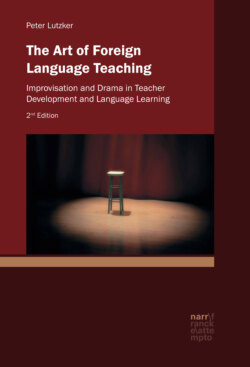Читать книгу The Art of Foreign Language Teaching - Peter Lutzker - Страница 47
На сайте Литреса книга снята с продажи.
4.5 Research Inquiry and Data Triangulation
ОглавлениеThe heart of this empirical study consists of the 55 replies from teachers who had taken part in his courses. As mentioned above, the fact that he has regularly given clowning courses for Waldorf language teachers since 1996, offered opportunities to assess data coming from a wide range of in-service courses occurring at different times, in different contexts and in three different countries. Hence, a key element of this research data can be seen as the extensive possibilities of data triangulation which this range of courses over a decade offers. On a longitudinal level, the responses to the courses that were received were written at very different points in time, ranging from replies in which participants write about courses they had just taken in the previous week, to other participants who are reflecting on courses which occurred many years earlier. The fact that the structure and content of the courses themselves have remained largely constant means that in attempting to assess the short-term and long-term significance of these courses, the possibility of a high degree of time triangulation of the research data is introduced. Thus, distinctions and parallels can be drawn between the short and long-term effects of such courses. This element of time triangulation can be considered a particularly significant aspect of this study, since the question of the long-term effects of in-service courses must be considered one of the most critical questions in this area of research.
Another element of data triangulation can be seen in the space triangulation which the participants’ responses offer. The fact that the courses took place in three different countries and that there has also generally been a strong international component to all the courses is reflected in the responses which were received: from the 54 responses 31 are from Germany and the rest are from other countries including Austria, Switzerland, England, Russia, Estonia, Lithuania, Sweden, Finland, Israel, France, Japan and the Ukraine.
A further significant difference between these courses can be found in the types of participants who took part. The Baltic Seminar, for instance, was primarily designed for teachers in their first years of Waldorf teaching, as opposed to the English Week which has a much higher percentage of very experienced Waldorf teachers. Hence this data offers the opportunity to evaluate possible differences between how experienced and less experienced teachers perceived the work.
